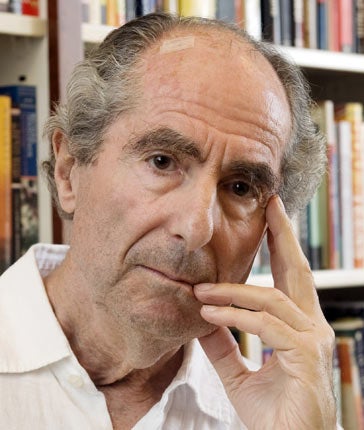Booker judge quits over prize for 'suffocating' Philip Roth

The Man Booker International Prize, which recognises an author's overall contribution to literature, is one of novel-writing's most prestigious prizes.
So when Philip Roth was awarded the coveted accolade yesterday, one would have thought the decision would be accompanied by the usual torrent of gushing tributes to his unassailable genius.
But an undignified spat has since broken out among the £60,000 award's three judges. Yesterday, publisher Carmen Callil made the bizarre step of "withdrawing" from the award's jury in protest at the decision, saying she "didn't rate [Roth] as a writer", despite having participated in the judging process until its final moments.
"He goes on and on and on about the same subject in almost every single book," she said. "It's as though he's sitting on your face and you can't breathe."
The jury's chair, book dealer and author Rick Gekoski, has hit back, branding Callil's public outburst "disrespectful". He told The Independent: "I regret very much what she has done. I think it is disrespectful to Philip Roth, as he is the story, Carmen is not the story." The only member of the jury to remain silent was novelist Justin Cartwright.
The award, whose previous victors include Ismail Kadaré, Chinua Achebe and Alice Munro, was announced in a ceremony in Sydney yesterday. Roth, whose novels include 1969 Portnoy's Complaint, documenting a man's diatribe during an analysis session, and 2000's The Human Stain, the story of a mixed-race man passing himself off as Jewish, said it was a "great honour".
Roth said: "One of the particular pleasures I've had as a writer is to have my work read internationally despite all the heartaches of translation that that entails. I hope the prize will bring me to the attention of readers around the world who are not familiar with my work."
Before the ink on Roth's cheque even had a chance to dry, Callil, who was the only member of the jury not to vote for him, went public with her disapproval. "I made it clear I wouldn't have put him on the long list, so I was amazed when he stayed there," she said. "He was the only one I didn't admire – all the others were fine."
Callil is founder of feminist publishing house Virago, and author of Bad Faith, a history of Vichy France. The shortlist also featured Philip Pullman, Anne Tyler and Marilynne Robinson.
Gekoski confirmed there had been a "long and difficult" meeting to decide upon the winner. "In the end it was decided that two of us wanted Philip to win and one of us didn't," he said. "We decided the majority would prevail. Justin and I felt that he was genuinely a good writer but Carmen didn't. Disagreement is common when deciding upon literary prizes. Going public on it isn't. We regret the process is now out in the open."
John le Carré was shortlisted but withdrew from the running in March. "I am enormously flattered to be named as a finalist of the 2011 Man Booker International Prize," he said in a statement. "However, I do not compete for literary prizes and have therefore asked for my name to be withdrawn."
Roth will pick up his award at a dinner in London on 28 June.
Philip Roth: For and against
"I'll tell you, those three recent books by Philip Roth just knocked me on my ass. To be in his sixties making work that is so strong, so full of revelations about love and emotional pain, that's the way to live your artistic life."
Bruce Springsteen, singer
"He is without doubt the greatest novelist writing in English today. Anyone, anywhere, interested in the construction of a sentence would have to admire and be enthralled."
Linda Grant, author and journalist
"All of his novels demonstrate an extraordinary, lively and witty prose, crammed with ironies and changes of perspective... There is no question, Philip Roth is one of the great writers of our era".
Justin Cartwright, novelist
"In 'Portnoy' the reader could believe that the women are monstrous because Portnoy experiences them as monstrous. In all the books that followed over the next 30 years, the women are monstrous because for Philip Roth women are monstrous."
Vivian Gornick, US essayist
"He presents his cast with touches of local colour ranging from appetising Jewish delicatessen to hilariously mimicked dialogue... [It] serves to make his caricatures consequently more vicious."
Marie Syrkin, Zionist author
Subscribe to Independent Premium to bookmark this article
Want to bookmark your favourite articles and stories to read or reference later? Start your Independent Premium subscription today.

Join our commenting forum
Join thought-provoking conversations, follow other Independent readers and see their replies